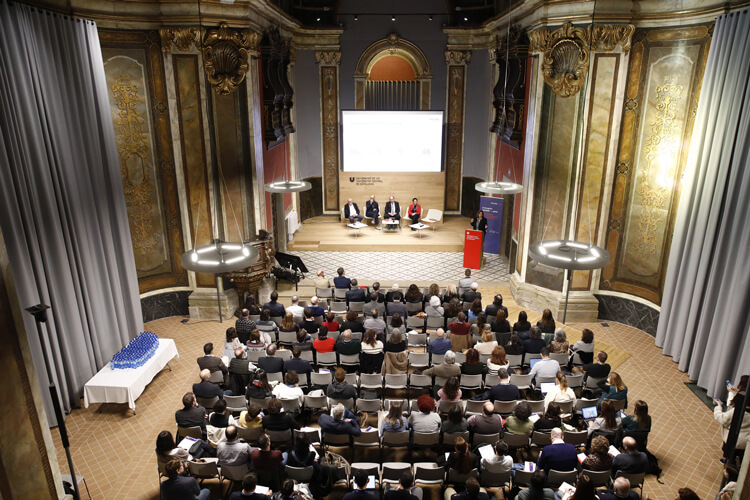2nd TECNIO Conference
On 23 November, the 2nd TECNIO Conference took place in the Casa de Convalecencia at the University of Vic – Universitat Central de Catalunya, under the slogan “An immersion in knowledge transfer.” The conference brought together representatives from the TECNIO groups with the aim of sharing experiences and encountering synergies for the challenges we face in view of the needs of companies in our surroundings. Collaboration between businesses and the TECNIO centres has become a common practice for industrial innovation based on knowledge transfer.
The event featured various presentations, roundtables, and a networking space to promote connection and dialogue among all participants. Of all the activities, it is worth highlighting the inspirational lecture by Oriol Guixà, president of La Farga and member of the Board of Trustees of the Balmes University Foundation, a founding member of the UVic-UCC.
Entitled “From research to the market through public-private collaboration,” the speaker began his presentation by defining the four essential concepts that form the various stages that make innovation possible, starting with research.
- “Research” can be understood as the creation of new scientific and technological knowledge typically led by scientists, professors, and researchers who are at universities.
- “Development” is the vision of creating the new product or service with technology, that is, the practical application of the new knowledge generated to address industrial challenges.
- “Knowledge transfer” represents the action of sharing, transmitting, and combining what we know and integrating it among the receiving agents with the aim of growth that goes beyond what is purely scientific based on scientific publications.
- Finally, “innovation” entails the improvement in processes and products that pursues the implementation of technological changes at the company level.
The above concepts take place at universities and technology centres, but also in the business sector or by entrepreneurs within an environment in which company managers also play a very relevant role.
Guixà also referred to the model created by Andreu Mas-Colell to promote research and innovation in Catalonia and stressed that we are currently bearing the fruits of the results, consolidation, and excellence of research in Catalonia. However, a certain imbalance between research and innovation is clear. Catalonia is considered a “strong innovator” yet is far from northern European countries which are at innovation leader levels. Not surprisingly, he also mentioned that Catalonia allocates 1.7% of its GDP to R&D, far from the 3% seen in leading countries.
In the final part of the conference, Guixà made a series of recommendations and proposals to the various agents to promote collaboration and an active approach. Above all, he stated that we need to listen more.
- For companies, he put the emphasis on taking a more active approach towards the centres that generate knowledge and to recognize the value and cost of knowledge transfer. As the productive sector, he implored them to take on the risk of innovation.
- He stated that higher education needs to focus on training talent with a better view of business needs and to seek their collaboration, for example, with two-way training programmes and mentioned industrial doctorates as an example.
- He said that the objective for research centres should not be the investigation of resources to maintain their structures, but R-T-I-D itself. He also told them that they must open up more and explain what they and their large teams do along with more greatly valuing the intellectual and industrial property they have with a view to transferring them.
- Finally, he told managers that there is still much to be done to promote knowledge transfer and that examples such as Fraunhofer and Max Planck can be models of inspiration for Catalonia.
To conclude, Guixà did not say anything that those of us who have been present in the world of research, development, transfer, and innovation have not known for years. Oriol Guixà, who has assumed various roles in the field, made himself clear because he explained everything through his experience. In doing so, he conveyed to us that he firmly believes in collaboration between the various spheres that make up the innovation processes.
Dr Núria Vallmitjana
Director of IQS Tech Transfer


